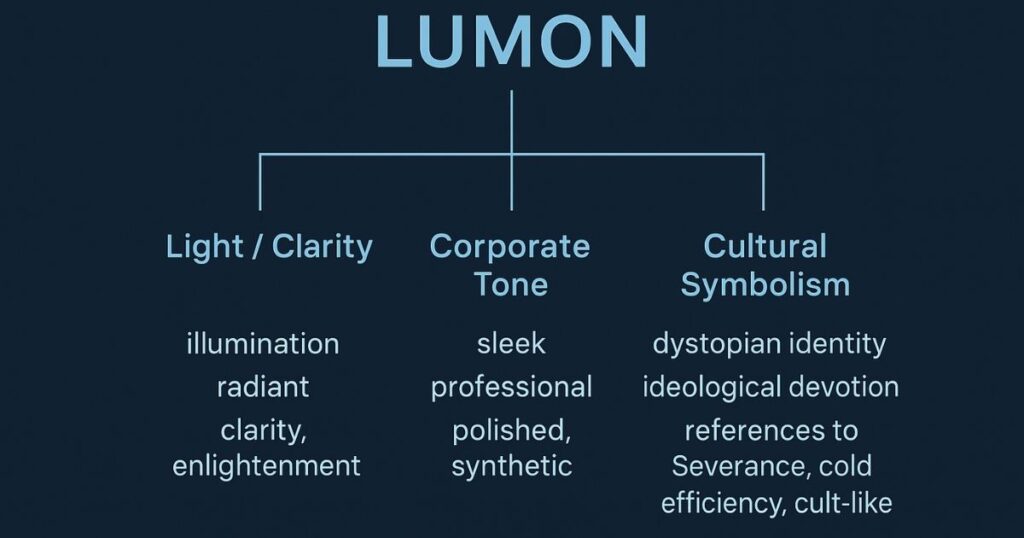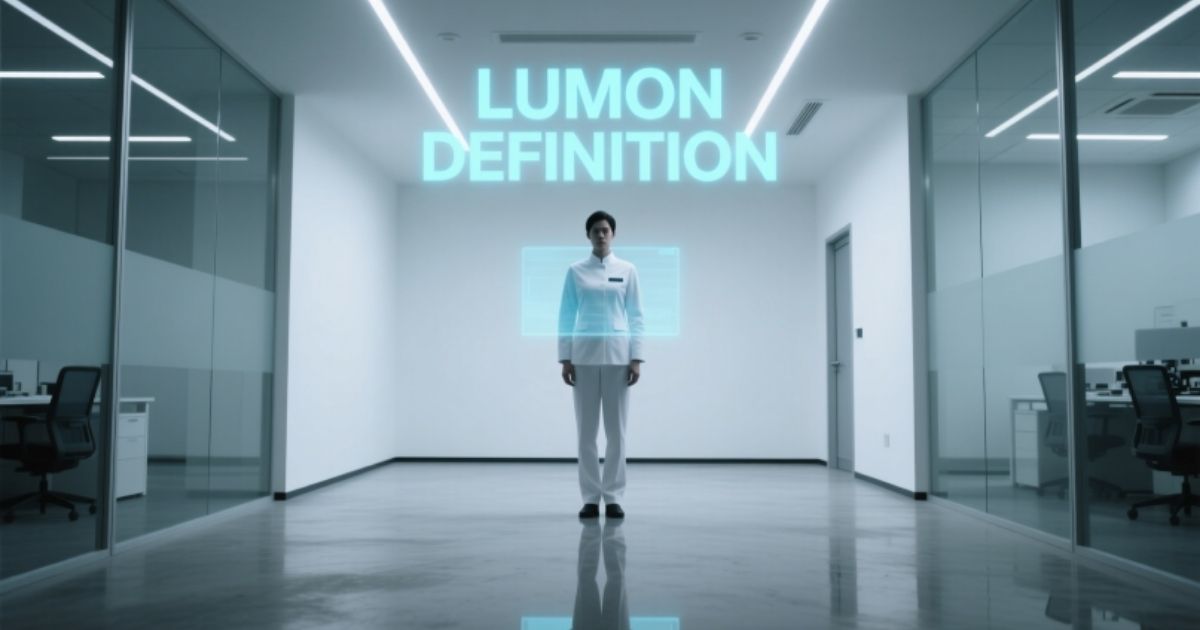Language moves fast. Words emerge from fiction, branding, and digital culture, then take on lives of their own. “Lumon” is one such term. It sounds official, almost scientific, yet carries corporate, dystopian, and symbolic weight. Whether you’ve seen it in Severance, heard it in branding discussions, or stumbled upon it online, Lumon demands attention.
This guide unpacks Lumon definition, etymology, cultural associations, and practical usage. You’ll learn when to use it, when to avoid it, and how it compares to similar words. By the end, you’ll understand what Lumon truly stands for in modern language.
Definition And Meaning
Lumon (noun / adjective, contextual)
Definition:
A modern term suggesting illumination or clarity blended with a futuristic, polished, and sometimes synthetic corporate tone. Often associated with sleek professionalism and, in some contexts, dystopian or ideological organizational imagery.
Etymology:
Derived from Latin lumen (light, brightness) + modern suffix -on, common in technological and corporate branding.
Usage Examples:
- “The office design was very Lumon, bright, sterile, and controlled.”
- “Her speech carried a Lumon kind of clarity, sharp, focused, nearly devout.”
Connotations:
Positive: enlightened, visionary
Neutral: corporate, professional
Negative: cold, sterile, cult-like

Origin and Etymology of “Lumon”
The word Lumon isn’t randomly assembled. Its root lies in Latin “lumen,” meaning light, illumination, or brightness. The suffix “-on” appears frequently in futuristic branding, technological terms, and corporate identity language.
Together, they create a word suggesting synthetic brightness, clarity, and polished professionalism. While no traditional dictionary defines it, Lumon feels legitimate, like “Silicon,” “Neon,” or “Xenon.” Its structure conveys innovation-forward language with a sleek, almost sterile edge.
What Does “Lumon” Mean in Modern Usage?
Lumon’s meaning shifts depending on context. Literally, it suggests illumination or radiant expression. Professionally, it describes corporate aesthetic, ultra-professional environments, or sleek branding. Symbolically, it represents ideological commitment, dystopian corporate culture, or cult-like devotion.
For example: “Their office felt Lumon, sterile, glowing, emotionless.” The word operates across visual purity, corporate symbolism, and speculative fiction contexts. Its flexibility makes Lumon powerful yet ambiguous.
Read Also This: https://trueheartblessings.com/lmr-meaning/
Cultural and Symbolic Associations
Lumon carries layered cultural symbolism. It connects to enlightenment, clarity, and technological futurism. However, it also evokes sterile environments, cold efficiency, and authoritarian atmosphere.
The Apple TV+ series Severance amplified its dystopian associations through Lumon Industries, a fictional company embodying corporate-coded oppression and ideological systems. This duality makes Lumon a mirror term, it reflects futuristic architecture and innovation while hinting at emotional detachment and synthetic professionalism.
Connotations and Tone of “Lumon”
Lumon’s tone fluctuates between positive, negative, and neutral, depending on usage.
| Tone | Connotation | Example |
| Positive | Enlightenment, visionary, radiant, clarity symbolism | “Her ideas had a Lumon quality, brilliant and forward-thinking.” |
| Negative | Dystopian, sterile, robotic, cult-like | “The workplace felt Lumon, cold, clinical, lifeless.” |
| Neutral | Corporate identity, polished, professional aesthetic | “Their brand has a Lumon vibe, sleek and modern.” |
This tonal range demands careful context.
Polite and Professional Alternatives
Sometimes you need Lumon’s essence without ambiguity. Here are alternatives:
- Enlightened → Suggests intellectual clarity and spiritual awareness without synthetic overtones.
- Radiant → Conveys warmth and positive brightness instead of sterile brightness.
- Corporate-coded → Directly describes sleek branding and professional identity.
- Synthetic → Highlights artificial polish and technological futurism.
- Stoic → Captures emotionless professionalism and reserved demeanor.
- Ultra-professional → Emphasizes rigid formality and polished efficiency.
These alternatives clarify intent in professional communication.
When to Use “Lumon”
Lumon works best in specific contexts. Use it when describing dystopian organizational identity, futuristic branding, or sterile environments. It excels in sci-fi writing, cultural commentary, and corporate symbolism discussions.
For instance: “The Lumon tower radiated synthetic glow.” It’s perfect for speculative fiction, brand identity language, or critiquing ideological commitment. In creative spaces, Lumon adds depth, suggesting luminosity with corporate futurism undertones.
When Not to Use “Lumon”
Avoid Lumon in formal business documents, casual conversation, or ambiguous settings. Most people won’t immediately grasp its dystopian corporate culture or Severance references.
In professional reports, it risks confusion or appearing pretentious. During everyday communication, simpler terms like “polished” or “professional” work better. If clarity and accessibility matter most, choose alternatives. Lumon requires context to resonate; without it, the word falls flat or seems like jargon.
Practical Examples of “Lumon” in Context
Let’s explore Lumon in realistic scenarios with interpretations:
Creative Writing: “The Lumon facility hummed with sterile brightness.” → Dystopian, authoritarian atmosphere, synthetic professionalism.
Brand Description: “Our company embodies Lumon innovation.” → Sleek branding, futuristic, corporate identity.
Cultural Critique: “Their workplace culture is pure Lumon.” → Cold efficiency, emotionless, robotic environment.
Casual Text: “That building is so Lumon.” → Polished, modern, sterile architecture.
Spiritual Context: “She radiated Lumon energy.” → Enlightenment, glowing presence, clarity.
Satirical Use: “His commitment borders on Lumon.” → Cult-like, ideologically committed, rigid.
Tech Marketing: “Powered by Lumon technology.” → Innovation-forward, synthetic, futuristic.
Fandom Reference: “This office feels like Lumon Industries.” → Severance reference, dystopian corporate.
Comparisons With Similar Words
Enlightened
Enlightened suggests intellectual growth and spiritual awareness. Unlike Lumon, it lacks corporate aesthetic or dystopian undertones. Enlightened feels warm and human; Lumon feels synthetic and polished.
Mysterious
Mysterious implies unknown qualities or intrigue. Lumon isn’t necessarily mysterious, it’s clear but cold. Where mystery invites curiosity, Lumon suggests sterile brightness and ideological systems.
Corporate-Coded
Corporate-coded directly describes professional aesthetic and brand identity language. It’s more explicit than Lumon, which carries additional dystopian and luminous layers. Lumon adds symbolic depth; corporate-coded stays literal.
Robotic
Robotic emphasizes mechanical behavior and emotional detachment. Lumon shares this quality but adds illumination symbolism and futuristic architecture. Robotic is purely negative; Lumon can be neutral or positive.
Stoic
Stoic means emotionally reserved and disciplined. Lumon incorporates stoicism but blends it with corporate futurism and synthetic professionalism. Stoic is philosophical; Lumon is visual and organizational.
Dystopian
Dystopian describes oppressive futures and authoritarian systems. Lumon evokes dystopia but specifically through corporate symbolism and sterile environments. Dystopian is broad; Lumon is corporately specific.
Glowing
Glowing suggests natural radiance and warmth. Lumon implies synthetic glow and sterile brightness, artificial rather than organic. Glowing is comforting; Lumon is clinical.
Synthetic
Synthetic means artificial or manufactured. Lumon embodies synthetic professionalism but adds luminosity and corporate identity. Synthetic is descriptive; Lumon is evocative.
Ultra-professional
Ultra-professional describes excessive formality and polished efficiency. Lumon captures this but adds dystopian and illumination layers. Ultra-professional is workplace-focused; Lumon is culturally broader.
Cult-like
Cult-like suggests blind devotion and ideological control. Lumon can imply cult-like commitment within corporate contexts. Cult-like is purely negative; Lumon remains contextually flexible.
Ideologically Committed
Ideologically committed means devoted to beliefs. Lumon can represent such commitment within organizational or dystopian frameworks. Ideologically committed is neutral; Lumon adds corporate and visual dimensions.
Regional or Cultural Differences
Lumon doesn’t vary significantly by region since it’s fictional and culturally constructed. However, Severance viewership concentrates in North America and Europe, where dystopian corporate culture resonates most.
In regions less exposed to corporate futurism or speculative fiction, the term may feel unfamiliar. Digital communities globally adopt Lumon metaphorically, but understanding depends on exposure to tech branding, sci-fi, and Apple TV+ content.
Background & History
Lumon’s modern prominence traces to Severance (2022), where Lumon Industries represents a mysterious, controlling corporation. The show’s sterile environments, ideological systems, and authoritarian atmosphere cemented the word’s dystopian associations. Before Severance, Lumon existed primarily as potential branding, a name suggesting innovation and clarity.
The series transformed it into cultural shorthand for cold efficiency and corporate symbolism. Now, Lumon appears in brand identity language, creative writing, and cultural critique, symbolizing the tension between enlightenment and oppression, light and synthetic professionalism.
Read Also This: https://trueheartblessings.com/ketchum-meaning/
Frequently Asked Questions
What does Lumon mean in text messages?
Lumon in text refers to something polished, corporate-coded, or futuristic with synthetic professionalism. It can describe sleek branding, sterile environments, or ideologically committed behavior.
Where does the word Lumon come from?
Lumon derives from Latin “lumen” meaning light or illumination, combined with the suffix “-on” common in futuristic branding and technological terms.
Is Lumon a real word in the dictionary?
No, Lumon isn’t found in traditional dictionaries but has gained cultural meaning through fictional media, particularly the Apple TV+ series Severance, and corporate branding contexts.
What does Lumon mean in Severance?
In Severance, Lumon represents a dystopian corporation with sterile environments, cold efficiency, and ideological control, symbolizing oppressive corporate culture and authoritarian systems.
How do you use Lumon in a sentence?
You can say “The office had a Lumon aesthetic, polished, bright, but emotionless” or “Their branding feels very Lumon with its sleek futuristic vibe.”
What is the difference between Lumon and luminous?
Luminous means naturally glowing or radiant with warmth, while Lumon suggests synthetic brightness, corporate professionalism, and often carries dystopian or sterile undertones.
Does Lumon have positive or negative connotations?
Lumon’s connotations shift with context, it can be positive suggesting enlightenment and clarity, neutral indicating sleek professionalism, or negative implying dystopian coldness and robotic behavior.
When should I avoid using the word Lumon?
Avoid using Lumon in formal business documents, casual everyday conversations, or situations requiring clear communication since most people won’t understand its nuanced dystopian and corporate references.
What are some alternatives to saying Lumon?
You can use enlightened for positive contexts, corporate-coded for professional settings, synthetic for artificial polish, stoic for emotionless demeanor, or ultra-professional for rigid formality.
Why is Lumon associated with corporate culture?
Lumon became associated with corporate culture through Severance’s portrayal of Lumon Industries and its use in sleek branding, representing futuristic professionalism, sterile brightness, and ideological organizational commitment.
Conclusion
Lumon defies simple definition. It blends Latin roots with corporate futurism, dystopian imagery, and symbolic depth. Whether describing sterile brightness, sleek branding, or ideological commitment, the word adapts to context while retaining its core essence: illumination filtered through synthetic professionalism. Understanding Lumon means recognizing its dual nature, both enlightening and oppressive, radiant yet robotic.
Use it wisely in creative, cultural, or branding contexts, but choose clearer alternatives for professional or casual communication. Lumon represents modern language’s ability to create meaning from fiction, branding, and collective imagination, standing as a testament to how words evolve beyond their origins.

Dome Ellis, the founder of TrueHeartBlessings, a space created to bring faith into everyday moments where hope is needed most. Through heartfelt reflections and soul-lifting blessings, my mission is to share divine encouragement, inspire inner peace, and remind readers that even the smallest moments can carry powerful miracles. Every word I write is rooted in love, faith, and the belief that light always finds its way to those who seek it.


